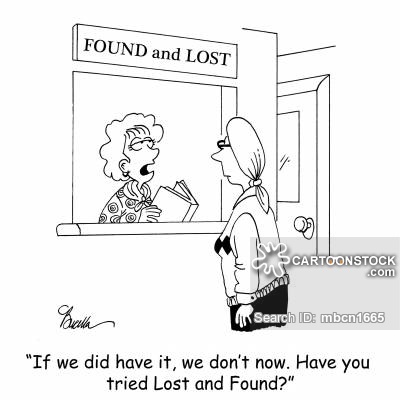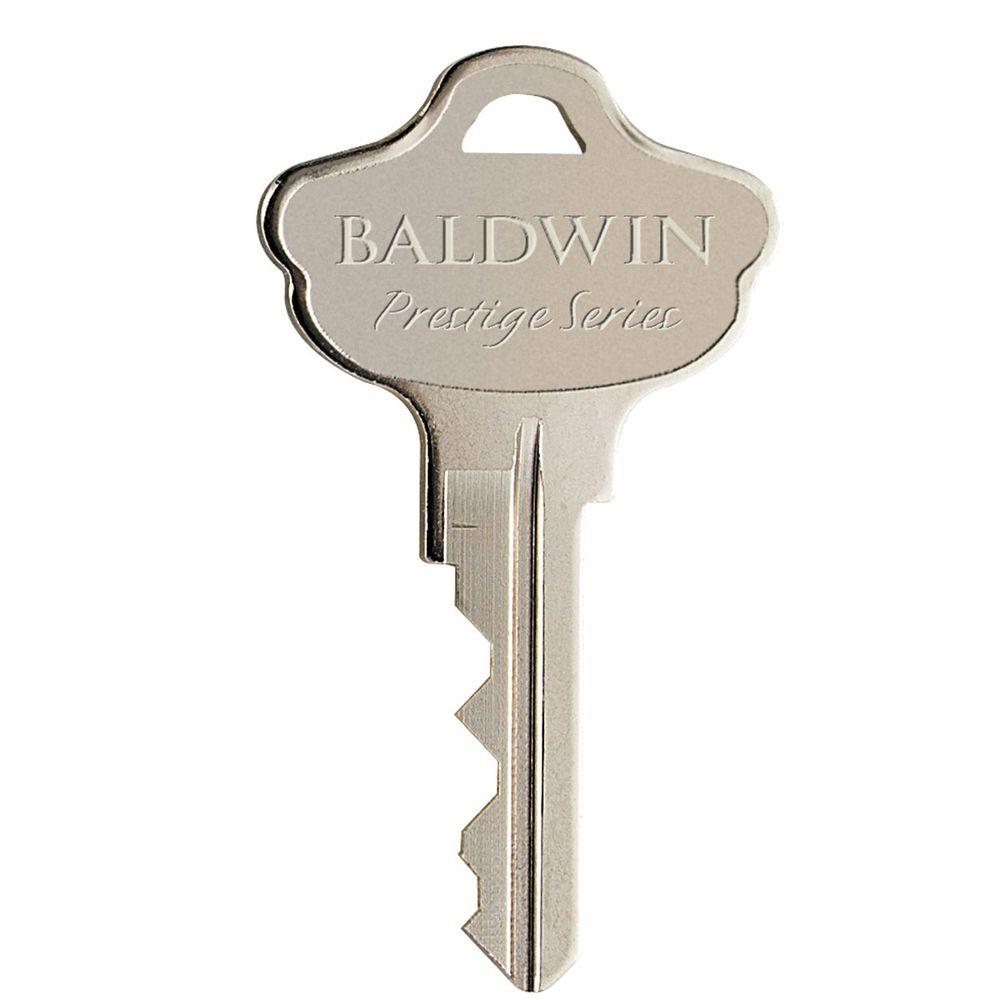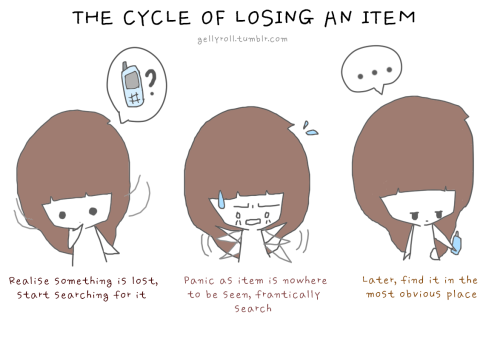When you lose something, there are few places it could sensibly be found. Maybe you had an item on your person and dropped it inadvertently, only to discover the loss at a later time. You might retrace your steps and go to every place you visited; you might even give up and chance upon the misplaced object at a later date.
Equally, you might start exploring obscure corners into which the offending article could never have projected itself. If you are of a paranoid disposition, your mind might start throwing in multiple unlikely or impossible scenarios: a conspiracy, a burglar, a poltergeist, ridiculous thoughts you know are dumb but which, in a state of frustration, you convince yourself are conceivable when any objective observer would realise is absurd.
It does not need to be an expensive item, just whatever you need or desire at that particular moment, the one item that will not fall readily to hand, and this that enrages a person most – even if it is their own stupid fault, even if paranoia takes over, even if accusations fly.
It was an idiotic fury that filled the heart of a man I will identify only as D. This anonymity is a reflection of his delicate position and public profile, though, like many people, he had a private life that was not greatly exposed to the wiles of the media; or alternatively, that no scandal had yet been attached that warranted detailed exposés in the press, and he intended to keep it that way.
D’s rage was not from fear of the potential consequences of his loss, but rather more because it resulted in a loss of control over the minor details of his life, and control was very important to D. D was a man whose goal was control over nature, which included all the fellow humans whose complicity or tacit approval was essential for the grand and usually self-serving ventures he proposed.
The object of his frustration might have been a lost cufflink as readily as his mobile phone, but in fact it was the key to his safe deposit box at one of the most discreet of private banks in London.
D had always considered safe deposit boxes the same way he considered the irreproachable safety of air travel: if one viewed boxes solely on the evidence of heist movies, one would think that barely a week would go by without their being blown by well-organised gangs, where in practice the sophistication of security systems employed by the finest banks made that almost a physical impossibility.
But the weak link of safe boxes was always the key, in all senses of the word: it was the means of decrypting the cipher, the critical component, the source to access meaning. If you do not possess the key, literal or metaphorical, you lose everything, you are virtually emasculated.
It was this pathetic sense of helplessness that caused D to regress to childish rage. He kicked the kitchen stool (hurting his toe more than the stool), he hurled a glass at the cupboard and then he howled; a hoarse, cathartic lament of a howl that ended in piteous sobs.
Were anyone present to witness his mental disintegration, D would have stayed rigidly in control of his temper, whatever burning he felt inside. D was a man who prided himself on his intelligence, which he defined as the ability to think in the abstract and to remain totally in control of his faculties under every situation.
That he had suffered what amounted to a tantrum, albeit one unseen by human eye, was a source of shame, in part because such a loss offended the aesthetics of D’s soul, a minimalism where nothing is out of place and clutter is tidied or at least hidden.
But as the temper subsided and a sense of calm re-emerged, D could not shake a deep-seated sensation of emptiness. Where was the key? Was it in his clothing? In his pocket maybe? Had he placed it in his wallet for safekeeping? Where and when did he realise he had lost it? Was he wearing different clothes at the time? Was it on the floor? Did it get kicked under the furniture? Had it fallen down the crack in the sofa?
No, no no no no, none of these. Wherever he looked, the key was, like Macavity, not there. He was alone in the house, the doors were locked. Had he seen the key since the last time anyone was in the house? He was not sure, could not be sure.
There was a woman in D’s life, a woman of glamorous appearance too, but only for official purposes. She was seen on his arm at functions and ceremonies, but at all other times they lived separate lives. It was, as D liked to say, a business arrangement. It was a business arrangement because D preferred to spend private time alone and to avoid the machinations and compromises of coexistence.
D sometimes wondered if he was closeted, but always dismissed that absurd notion. He was a man who had a woman beside him when he needed a woman beside him, because that suited them both.
She was fastidious by nature, enjoyed showing off expensive gowns and jewellery and generally of keeping up appearances. She loved to be seen in the best company, since it distracted from what might otherwise be judged a humdrum existence. If that meant shoring up his ego with a few well-timed morsels of glowing rhetoric in exchange for the good life, she was happy to oblige.
He, by contrast, was rarely superficial or grandiose. He attended these functions because it came with his public persona. He did not care for the glamour, the champagne, the rich food, nor the ingratiation. The two were poles apart and therefore functionally incompatible, yet shared this none mutual need.
But for these purposes it meant that she surely could not have the key. Indeed, he was not even sure if she was aware about the safety deposit box or the existence of his key. Why should she? Theirs was not primarily a financial arrangement: each did not wish for what the other possessed, and in the course of their relationship he was quite certain she had never stolen from him.
And yet… Could she have taken the key by mistake? An unlikely contingency, given that the key usually lived well-hidden in D’s bedside table. He had often thought he should install a safe but now cursed himself for not getting around to such necessities of self-preservation. Had he stored it securely, it would have been protected against theft and loss. It would still have been there now, though even then the act of removing and replacing the key gave rise to the risk something might happen in the meantime that caused it to go missing.
Stop this, D growled to himself. He was resourceful in a crisis, or so he believed. He was the man people turned to in an emergency, a friend to those in need, though his support invariably came at a cost, one he exacted at his convenience. Imagine this was somebody else’s problem, he thought, decide the price later.
The key, focus on the key, D told himself. It was here, of course it was, nowhere else it could be. He just had to eliminate the possibilities. Logic wins out eventually, you just have to be tranquil and work out where a slender bar of cheap metal could fall unnoticed.
For the fifth time, he opened the second drawer of his bedside cabinet, removed the false bottom and opened the small compartment where the key habitually nestled with a silk handkerchief for a bed. The handkerchief was still there but the key was not. Taking the handkerchief out and shaking it made no difference. The key was not present, no matter what D did.
It was, in itself, an insignificant object without intrinsic value. It was a key like a million other keys, narrower than door or car keys but broader than a suitcase key. It was a means to an end, nothing more.
It was at this point that D thought for the first time since his loss about the contents of the safe box. He realised slowly that he had no immediate need for the objects within the locked box, only the reassurance that they were still in place and untouched. By losing the key he was being denied possible access in case the need did arise, which it might on some day, any day.
But once that slim possibility arose in D’s mind, conspiracy theories followed soon after. Professional burglars knew what they were about, knew how to achieve their targets with minimal fuss; no need to ransack a place if you could just achieve your target. Could that target be his key, and if it were, what consequences would ensue?
None, because the loss would be solely his. Nobody else would be impacted.
It was a ludicrous train of thought, was it not? Would anyone really break in to take the key in order to obtain the valuables, the personal items he had locked away in a bank vault? Pah!
Would they go so far as to masquerade as him, to impersonate his appearance and demeanour in order to persuade the bank’s head of personal wealth to use his matching key in order to gain access to the box? Would anyone even know of its existence, let alone what he had secreted? Risible!
And yet… you never knew what people were capable of or what they knew about you. This essential truth nagged at D’s mind.
Did he have enemies? Everyone in a public role has enemies, and if revenge is a dish proverbially best served cold, anyone he had ever slighted might yet find a way to get their own back when least expected.
Not just personal enemies either. After all, as a man in a public position he was routinely subject to media attention, so it would be relatively easy for anyone who disagreed violently with his personal philosophy to hire a surveillance expert to pose as a member of the paparazzi and monitor his every movement before choosing some nasty way to hurt him for perceived injustices.
No matter who it was, it was not beyond the realms of possibility that every sordid detail of his life had been logged as part of a scam, a feeling he had always dreaded and far and away the worst aspect of a public life, and there was not a single person who did not have something to hide.
All the more reason then to value and preserve his privacy. He had built his battlements high, the crenellated walls concealing vats of boiling oil to hurl on those who got too close. For those who dare to pry, D always reserved his most vicious barbs.
Enough! D’s mind was running away with him. When this happened, and it happened with an infuriating regularity, he hated himself more than anyone else in the world. He was the author of his own misfortunes, none more so than having lost his key through sheer fucking stupidity.
D did not often swear, but when he did it was invariably at himself. Someone once taught him the facts of media relations, rule one of which was that no matter how private you think any conversation, someone is always listening and ready to use what they learn against you. Exposés with his expletives bleeped out would not make comfortable viewing, nor enhance his career any.
As a symbol of his private life, the loss of the key was as personal as his swearing habit. Nobody could be told about this, not even those closest to him. His elderly mother would scoff, but then she always was a scornful woman who belittled his many achievements. She would never be told about his failures. Showing weakness was simply not an option, even if it was a mere oversight.
D methodically checked all the pockets in each of his eight handmade suits (one for each day of the week, plus an alternative for the following Monday), then each of the silk gowns in which he lounged alone by the television, then the while towelling gowns he wore after bathing or swimming.
The pool complex behind his sizeable gated home was D’s pride and joy. He did not need a house with five bedroom suites but he liked the space and independence it gave him, and especially the pool.
The pool! Might the key have fallen in the pool? D followed the corridor down the pool at faster than an average stride. Hurriedly donning one of many pairs of trunks, he dived clumsily into the pool, checked every corner and felt all the sluices in turn before coming up for air.
He checked all the drain filters but nothing more than lost hair resulted, the consequences of ageing. In his vanity, D had once considered hair replacement before deciding this would only make him look more pompous, even more a laughing stock than he already was.
Where next? D dried and dressed himself, then inspected each room in the large house with feverish intensity before succumbing once more to lateral thinking.
Who else had been in the house? His housekeeper, that’s who! Inez worked on Mondays, Wednesdays and Fridays, having done so for some years. She was a woman who used words sparingly but whose looks were the stuff of legend. Even so, Inés had a heart of gold and would always bring to his attention anything unusual she had found. That the house was so usually in a state of order was demonstrated by how rarely this occurred. She did not even gossip about her indolent husband or her army of offspring, which was just the way D liked it.
D called the cleaner’s number from the preset on his phone, though the call was answered by an elder daughter, possibly the one with several children of her own. No, her mum was not there, she was working. Yes, she would pass on the message, thank you and goodbye. No closer to finding the key though, and no real hope a call back will lead to success.
Nowhere left to look. What did you do when all possibilities were exhausted? D felt more impotent than at any time, defeated by a small object of the kind over which he expected total mastery.
People in their simplicity quoted clichés at him as if these platitudes somehow offered some great revelation about life and universe. “It will turn up when you least expect it,” they might say, in the event he were to confess this incident. Such aphorisms infuriated D almost as much losing the key.
It was an accident of nature, the way that accidents occurred. People misplaced things every day, and usually found them within seconds. For it to last an hour was painful, for a day traumatic, and any longer a virtual disaster. People were impatient these days.
But supposing it never turned up? And what would happen if he reported the loss to the bank, exposing himself to ridicule? There would be a process of some sort, giving rise to interrogation. Questions would be asked and he would need to confirm that he had not treated such a valuable item with profligacy, which thought sent a shard of ice through D’s heart. D was not by nature foolhardy, and the thought he might be accused of carelessness prickled his dignity.
That said, inadvertent negligence or forgetfulness were aways possible. D was and is human, and humans were and are inherently flawed, but reckless? He was not reckless, not ever, no sir!
Or was he? Self-doubt was not a common feeling for D, yet it only took one negative and suddenly these feelings washed over you. Every perceived failure, every error of judgement, every gamble that fell flat, they all came back to haunt you.
In the absence of brainwaves and the presence of doubts, the doorbell was a welcome relief. though not even Jehovah’s Witnesses commonly subjected themselves to D’s cross-examination, and kids rarely ventured up his drive on Halloween. Who would call on a Sunday? His aides and assistants would call his mobile, though even they were quiet and presumably taking advantage of quality time with their loved ones.
The downside of a solid oak door was that it hid the callers behind. True, a viewing lens was built in, but by then he was at the door and the visitor knew it.
The lens revealed…. the woman. D did a double take but there she was, and looking agitated. Not in her glad rags either, since they were not due to be seen in public. Rather, she wore leggings, boots, a warm jacket, a rainbow scarf and matching bobble-hat, in recognition that this early October evening had taken with it the sun’s warmth.
Cautiously, D opened the door. The woman marched in without a word. Too surprised to complain, D shut the door behind him and subjected the woman to an inquisitive look. Rather than sit, she paced around the substantial entrance hall in the manner of a woman upon who nature has bestowed worries more serious than losing a mere key.
But I can’t just refer to her as “the woman”; that is disrespectful. Here, I will call her G, all the more since she has since become renowned, if not notorious, in her own right.
“This is going wrong,” she mumbled, “We’ve been found out. I got called by a reporter. He asked me about my relationship with you….”
“He WHAT?” D exploded.
“They know we’re not a couple, that’s it’s all for show,” G wailed, “I think they are pulling together a critical article about you. I expect they will be knocking on the door and asking for quotes tomorrow.”
D felt deeply affronted but decided to come out fighting. Which of his rivals could have dished dirt on him? he wondered. “I’ll kill the bastards,” he said beneath his breath, though G barely heard him.
“They virtually accused me of being a prostitute,” wailed G, “I denied that you paid me but they even asked if we sleep together.”
“What did you say?” D asked in hushed tones, horrified at the very thought, perhaps fearing the response. Maybe he feared that G denied it, but did not say so.
G stood upright and looked around as if mortified by the thought of having to soil her lips with the words. “I said we were both celibate,” she replied with great distaste.
Whether or not this was technically true in both cases was, to D’s mind at least, almost beside the point. “Perception is reality” was arguably the only maxim with which he could readily agree. In this case, his desire was to create the image of a contented couple who led a full and active life together, saw nobody else and were rarely out of one another’s company.
That his deception was pierced would cause D a headache, since he would have no choice but to disprove the reality, even if that meant G moving into his house, and, if necessary, the luxurious circular bed in which he enjoyed nothing better than to starfish alone.
He told G exactly what he had been thinking. She listened, nodded solemnly, then smiled grimly. “If so, I think we need to renegotiate the terms, don’t you?” she said sweetly.
G and D looked intently at one another, for they both knew exactly what she meant.
The conversation continued along the same vein for several more minutes without conclusion, though D slowly became aware that this catastrophe had momentarily diverted his fevered mind from losing the key. Priorities in life changed all the time, he told himself. This one had been put into slight perspective, but having been remembered once more now took precedence.
“Slight change of topic,” said D to the distraught G, patting his pockets. “I don’t suppose you’ve seen a small silver key of mine. I appear to have misplaced it.”
“I beg your pardon?” asked G, looking vaguely shocked and distracted. D felt a touch of sympathy.
“A key. I lost one. I thought maybe you might know where it is,” he repeated, expecting a negative response.
“I – I don’t think so,” said G. She was fulfilling his expectations, that much was accurate, though there was something strange about how she said it. Her body language shifted subtly from open in the direction of closed; her eyes slid off to one side to avoid his gaze.
D’s long study of human psychology told him this woman was telling the truth about being interrogated, but was that not a lie about the key? If he had to bet on it, he would put at least £100 on the certainty that his key was in G’s possession, even if he could not explain how or why. His intuition told him this and D trusted his gut feel… most of the time.
But before he verified his reading, there was a simple yet deeply troubling paradox here that might easily affect what he did next. He tried to reduce it in his mind to a series of bullet points:
- To prevent the risk of his professional life being ruined by scandal, lying was the only feasible option.
- Lying did not, of itself, put him off, since white lies were sometimes essential to oil the wheels of life.
- However, this required G to lie by pretending to be D’s full-time partner, and indeed to conspire with D to tell the same lies.
- If G is already lying about the key, it is quite evident she is not averse to the principle of lying either.
- However, if being with G to preserve one lie, his lie, meant exposing a different lie, her lie, who would be the first to break?
- He could confront her now about the key, and just maybe she would return it, unless he was making a disastrous error.
- Whether or not she did possess the key, the act of accusing her would result either way in her refusal to lie on his behalf, thereby throwing him to the wolves.
- This in turn would mean he would be on his own in dealing with the press or whoever those people were, which might just be alright… or it might not, but could he afford to take that risk?
- On the other hand, saying nothing about the key would mean she would help him… and he could do further research and try to find if and where she had stored the key, if indeed that was what she had done. And notify the bank, of course.
Ergo, why ditch her and brazen it out when you could double up your options and stay safe. And yet…
But the risk, however infinitesimal, that he might be reading both scenarios wrong, made him waver. Had he been James Bond, D would have suffered no shades of doubt, he would have acted on principle. It was at moments like this you found out exactly what sort of person you really were.
“Are you sure?” said D, moving forwards and holding G’s head so she had no choice but to gaze directly into his eyes.
G stared back but said nothing for what seemed like a very long time.
“If you’ve lost a key, perhaps you’d better work back systematically through all the places you’ve been,” she said with a level voice, “It’s bound to be there somewhere. Perhaps I can help you?”
To D this sounded like game-playing, though he could not be entirely sure. G had spotted this weakness and was exploiting it. Worse, she was going for the kill, daring him.
D suddenly felt as if he had failed his one big test. He felt as feeble as he had ever felt. What could he do?
The urge to find the key welled up in his brain.
***
The following day, D’s body was recovered by the police from the area beside his pool with wounds from a shotgun shell fired at point blank range. Given the evidence, the coroner said privately that he was 99% certain the death was suicide, since all the forensics pointed in that direction.
There was however one strange aspect that did not fit and was being investigated by the police. This was the discovery of a small silver key clutched in the hand of the victim. The key belonged to the victim’s safe deposit box, which proved to be empty.
There was no evidence of theft, though the bank manager confirmed that the box had been opened by D and Mrs D, who seemed like a couple very much in love. Mrs D had apparently been called away urgently and had been contacted so she could make a statement, though it was believed she was not home with her husband at the time he killed himself.
Police were privately said to be baffled.





